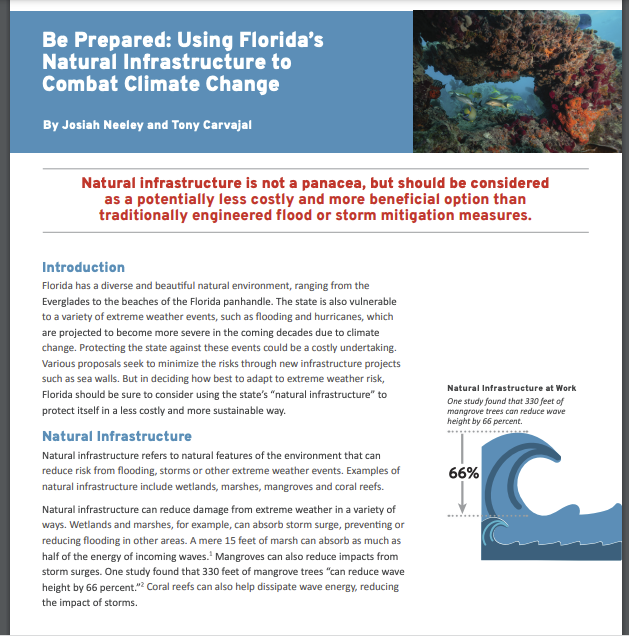IDEAS IN ACTION: Be Prepared: Using Florida’s Natural Infrastructure to Combat Climate Change
Guest Column By Josiah Neeley
 Natural infrastructure refers to natural features of the environment that can reduce risk from flooding, storms or other extreme weather events. Examples of natural infrastructure include wetlands, marshes, mangroves and coral reefs. Natural infrastructure can reduce damage from extreme weather in a variety of ways. Wetlands and marshes, for example, can absorb storm surge, preventing or reducing flooding in other areas. A mere 15 feet of marsh can absorb as much as half of the energy of incoming waves. Mangroves can also reduce impacts from storm surges. One study found that 330 feet of mangrove trees “can reduce wave height by 66 percent.”2 Coral reefs can also help dissipate wave energy, reducing the impact of storms.
Natural infrastructure refers to natural features of the environment that can reduce risk from flooding, storms or other extreme weather events. Examples of natural infrastructure include wetlands, marshes, mangroves and coral reefs. Natural infrastructure can reduce damage from extreme weather in a variety of ways. Wetlands and marshes, for example, can absorb storm surge, preventing or reducing flooding in other areas. A mere 15 feet of marsh can absorb as much as half of the energy of incoming waves. Mangroves can also reduce impacts from storm surges. One study found that 330 feet of mangrove trees “can reduce wave height by 66 percent.”2 Coral reefs can also help dissipate wave energy, reducing the impact of storms.
Meeting Florida’s future climate challenges will require ingenuity, and the state will need to use every available mechanism to reduce risk at reasonable cost. Taking full advantage of Florida’s natural resources must be part of that process. While not appropriate in every case, the state needs to consider natural infrastructure solutions as an option in planning and implementing mitigation projects.